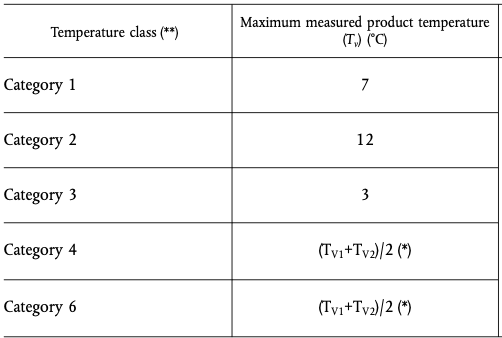NEW REGULATION FOR REFRIGERATING APPLIANCES WITH A DIRECT SALES FUNCTION : Since 01 March 2021, the new EU energy label and ecodesign regulation for refrigerating appliances with a direct sales function (incl. refrigerated vending machines) have come into effect.
- The most important details and requirements as well as the differences in minimum efficiency requirements between the EU and Switzerland can be found in this Topten summary.
- You want to know what energy class your appliance now has? The Topten Check Excel for Display Refrigerators calculates EEI, energy class, conformity with Swiss efficiency requirements and indicates qualification for listing on Topten.
|
Methodology
Topten.eu presents the most energy efficient refrigerated vending machines on the European market. All listed products use natural climate-friendly refrigerants.
Scope
The refrigerated vending machines listed:
- are plug-in cabinets (remote cabinets are not considered)
- are available on the European market
Technical criteria
All models on Topten.eu meet the following criteria:
- Natural refrigerant with global warming potential (GWP) ≤ 3 (e.g. R290/propane, R600a/isobutane, R744/CO2)
- Energy efficiency class D or better (EEI < 50)
Energy consumption
- Measurement according to European standard for vending machines (EN IEC 603252:2020)
while measured at 25°C, 60% relative humidity (climate class 3)
Data sources
Data according to the above standards is provided by manufacturers.
Calculation of the energy efficiency index (EEI)
EEI = (AEC/SAEC)*100 = (TEC * 365 / ((M + N * Y) * 365 * P * C)) * 100
|
Category
|
Value for M
|
Value for N
|
Value for Y
|
Value for P
|
Value for C
|
|
Refrigerated Vending Machines
|
4.1
|
0.004
|
Vn
|
1.00
|
1+(12-Tv)/25
|
TEC = energy consumption over 24h
Vn = net volume in litres
Tv according to the table below


Order of presentation
Products are ranked according to energy efficiency index (EEI). The order of presentation can be changed by selecting the sorting order on the right top of the list.
Glossary
Brand, Model, Other models
Brand with link to website. All other models (different sizes etc.) that are named meet the Topten technical criteria as well.
Electricity costs
Costs for electricity during product's life time. Assumptions:
- Typical life time: 8 years
- Annual energy consumption: Value from product list in kWh/year
- Tariff of electricity: 0.3 €/kWh (there however can be large differences depending on country or electrical utility)
Net volume, Gross volume
Net / gross volume in liters.
Storage temperatures
Storage temperature range in °C.
Energy
Annual energy consumption in kWh/year. Accepted measuring protocols see above.
Refrigerant
- R600a (isobutane, climate-friendly refrigerant)
- R290 (propane, climate-friendly refrigerant)
- R744 (CO2, climate-friendly refrigerant)
- Inefficient models: R134a, R404A or R507 (fluorinated refrigerants with high global warming potential)
Cooling
Dimensions
Width x depth x height in cm.
Countries available
This item displays the availability of models in European countries according to producers’ information. "EU" means that the model is available in all or most European countries. If the model is available in a number of countries only they are indicated by country codes according to ISO. "On demand" means that producers could not indicate the availability and that consumers have to ask in their countries on their own.
Infoplus
Publications
- The first energy labels for professional cooling appliances - lessons learnt. Steffen Hepp, Maike Hepp. EEDAL 2022, Paper and presentation
- Topten Summary on Energy Labelling and Ecodesign Regulation for refrigerating appliances with a direct sales function, Nov. 2020
- Memo on product declaration to Topten
- ProCold Publishable Report, project results 2016-2018, July 2018
- ProCold Technical Report, market overview and development 2016-2018, April 2018
Standards and labels
- EN IEC 603252:2020 Energy consumption of Vending Machines - Classification, requirements and test conditions
- European Committee for Standardization (CEN) and European Committee for Electrotechnical Standardization (CENELEC), CEN-CENELEC
Energy label and ecodesign requirements:
Links
- Energy efficiency measures by the European Commission.
- eceee, the European council for an energy efficient economy, provides a status overview on all products in the Ecodesign & Energy Labelling process.
- Coolproducts informs about the EU ecodesign process. It is a coalition of NGOs' campaign for a stronger, fast Ecodesign Directive to save the climate and money.
- ECOS (Ecostandard) is an international NGO with a network of members and experts advocating for environmentally friendly technical standards, policies and laws.
- EPREL (European Product Registry for Energy Labelling) is the European product database. Products with an energy label are registered in EPREL in order to provide consumers with detailed product information.
Manufacturers and dealers are kindly asked to contact info(at)topten.info to inform about more products meeting the Topten selection criteria.
04/2025 Hepp
 Epta Chelsea Boost
Epta Chelsea Boost Epta Brera Boost
Epta Brera Boost Epta Trocadero Boost
Epta Trocadero Boost True TGO-27~POP01~TSL01
True TGO-27~POP01~TSL01 Epta Trocadero Pro
Epta Trocadero Pro
